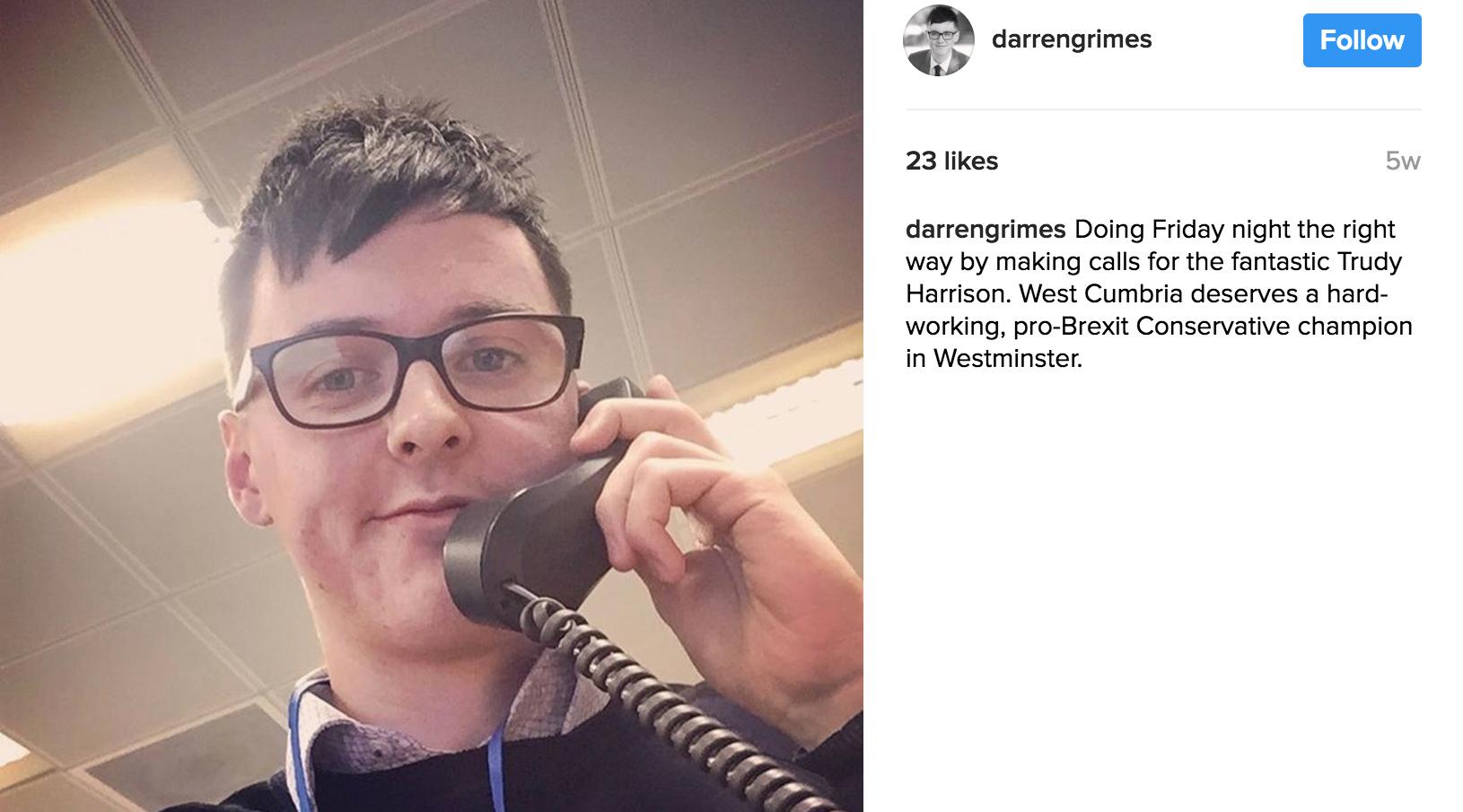Darren Grimes, a young Brexit campaigner, is shown making political calls.
When the UK government officially filed divorce papers Wednesday to leave the European Union, Darren Grimes woke up a happy camper.
“I’m extremely optimistic about our future chances outside in the world!” he chimes. “I think Brexit and the repeal bill present a great opportunity to bring about the changes our country so desperately needs.”
Grimes, the deputy editor of the website Brexit Central, is not your average Brexiteer. He’s 23 years old, a former fashion student and an LGBT rights advocate. He's also a founder of the anti-EU BeLeave campaign.
“I come from a liberal persuasion,” Grimes says. “I’m a gay man.”
He’s from a working-class family in the northeast of England — an area with the UK's highest unemployment and a lower average wage than other parts of the country. It’s a region that voted overwhelmingly to leave the EU.
“My grandfather was a miner, my mother works in the public sector. My brother has been unemployed for a very long time,” Grimes says. “I see how people feel about losing control over their own lives, and they feel there is a massive democratic deficit. It was one of the key reasons why I began to think that the EU is not really the progressive, liberal organization that I had been brought up to think it was.”
In last June's EU referendum, the "leave" camp won by about 52 percent. But according to exit polling, nearly 75 percent of 18-to-24-year-olds voted to remain. Grimes says most of his fellow millennials were sold a bill of goods.
“[We] haven’t known a day since the United Kingdom wasn’t in the European Union,” Grimes says (they joined what was then the European Economic Community in January 1973).
“My generation has grown up being told that it’s the EU giving all of us money, that the EU is this progressive bastion of liberal politics. But actually it’s the UK that’s ahead of the curve on same-sex policies, on women’s rights,” according to Grimes. “We’ve been sold a pup, really!”
He rejects the left’s characterization of Brexiteers as protectionist and xenophobic. While conservative politicians like Nigel Farage and his UK Independence Party used anti-immigrant rhetoric and racist tropes while campaigning for Brexit, Grimes says the referendum was not about that.
“Forget about Nigel Farage,” Grimes says. “I thank him for bringing about the referendum, but I disagree with him on almost every single issue including his referendum campaign.”
Grimes says the vote was really about self-determination. "Actually the […] debate focused on control. It said, 'Yes, let’s have immigration but let’s have our parliamentarians, our lawmakers, be in charge of who comes here and how many people come here,'" Grimes argues. "Not once did I hear anyone say, 'Look, let's shut our borders, let's retreat from the world stage.'"
Grimes stresses that he’s not anti-immigrant. “I am quite the opposite of a bigot or a racist,” he says.
And in fact, he sees Brexit as an opportunity to have a more open and flexible migration policy. “I would ideally like to see a more liberal immigration system, one that doesn't discriminate against those from the rest of the world.” For example, he says, his “friends in Pakistan and Canada cannot come to the UK unless they earn more than 40,000 pounds a year. I think that's incredibly unfair — that anyone with an EU passport has some kind of divine right to be here. I could not understand how free movement could be presented as a liberal internationalist policy when it discriminates against people” from non-European countries.
On Wednesday, as the UK delivered its letter to Brussels initiating a two-year breakup process, some EU leaders warned what the separation could bring. European Council President Donald Tusk told reporters there is “no reason to pretend this is a happy day.” He emphasized that the priority now is to minimize costs for EU citizens and member states, implying that negotiations with the UK could be tough.
oembed://https%3A//www.youtube.com/watch%3Fv%3DmxMhDMhIHWo
French President François Hollande said while Brexit is "sentimentally painful" for the Europeans, it will be "economically painful" for the British.
But Grimes says he’s not worried. “I think it’s actually in the EU’s interest to sign a trade agreement with the UK, because of the amount of cars Germany exports to the UK, the amount of French wine that we buy, Italian fashion … and I think economic realities, pragmatism, will win out in the end.”
In addition to continued cooperation with Europe, Grimes sees an opportunity to strike pioneering free trade deals across the world: “Let’s make those trade agreements with America, with the growth markets of the world, and that will benefit our generation immensely,” Grimes says.
“We’re no longer shackled to Europe!” he says. Ten years from now, Grimes predicts, “This will be seen as the best decision the United Kingdom has made since Margaret Thatcher. I think we’ll look back on this as a great moment in British history.”
Every day, reporters and producers at The World are hard at work bringing you human-centered news from across the globe. But we can’t do it without you. We need your support to ensure we can continue this work for another year.
Make a gift today, and you’ll help us unlock a matching gift of $67,000!
